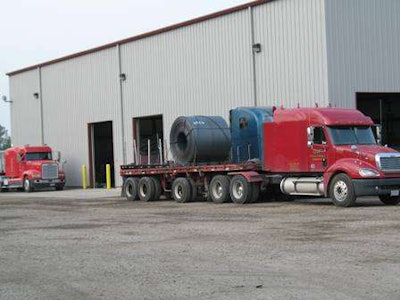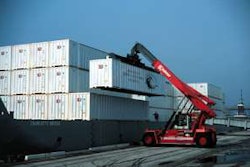
The Federal Motor Carrier Safety Administration is seeking comments on a petition submitted by the American Trucking Associations requesting a determination that Alabama’s Metal Coil Securement Act is preempted by federal law. FMCSA wants comments on what effect, if any, that Alabama’s metal coil load securement certification requirements may have on interstate commerce.
Alabama’s Metal Coil Securement Act, enacted in 2009, prohibits a motor carrier from transporting metal coils in a movement that originates or terminates in Alabama unless the driver is certified in load securement. The law, as originally enacted, also required the driver to carry a copy of the certification in the vehicle and produce it upon demand. Maximum penalties for violating these requirements include fines of between $5,000 and $10,000, jail time and/or a court order prohibiting the driver from operating a commercial motor vehicle in the state. Alabama later amended the Metal Coil Securement act, removing the requirement for drivers to produce the certification upon demand.
Alabama now offers CMV drivers three options to become certified in load securement: obtain a Metal Coil Certificate by taking and passing the “Securing Metal Coils Course” available for $25 at www.metalcoiltraining.com; obtain a commercial driver’s license endorsement that allows the driver to haul metal coils in the issuing state; or obtain a Metal Coil Certificate from a motor carrier authorized by the Alabama Department of Public Safety to issue the certificate, which would require the carrier’s safety compliance officer to submit a notarized affidavit to ADPS.
On June 26, 2009, FMCSA sent a letter to then-Gov. Bob Riley of Alabama stating that the act appeared to be incompatible with the requirements of FMCSA’s Motor Carrier Safety Assistance Program. FMCSA also drew attention to two federal laws authorizing preemption of state legislation and indicated that they might be applicable.
The agency urged state officials to work together with FMCSA officials to resolve any conflict between state and federal law. Riley responded that the act was adopted in response to a number of accidents in Alabama involving the transport of metal coils and that Alabama’s metal coil load securement certification requirements were not preempted by federal law.
On Dec. 22, 2010, ATA petitioned FMCSA for a determination that Alabama’s metal coil load securement certification requirements and penalties create an unreasonable burden on interstate commerce and are preempted under federal law. ATA contends that Alabama’s requirement that drivers obtain certification in metal coil load securement is more stringent than and incompatible with federal metal coil safety regulations. In a letter dated Jan. 25, 2011, ADPS acknowledged that the requirements of the act are more stringent than federal regulations, but stated that the requirements should not be preempted because they have safety benefits and do not place an unreasonable burden on interstate commerce.
FMCSA says that although preemption under federal law is a legal determination reserved to the agency’s judgment, it is seeking comment on what effect, if any, Alabama’s metal coil load securement certification requirement has on interstate motor carrier operations. Commenters also are encouraged to submit information on similar requirements imposed by states other than Alabama. In requesting comments, FMCSA does not seek legal conclusions, but does request information on the safety, economic and operational effects, including cumulative effects, of Alabama’s and other states’ requirements. FMCSA requests commenters to limit their submissions to these issues and to submit data supporting their positions.
To comment, go to www.regulations.gov; the docket number is FMCSA-2011-0318.











